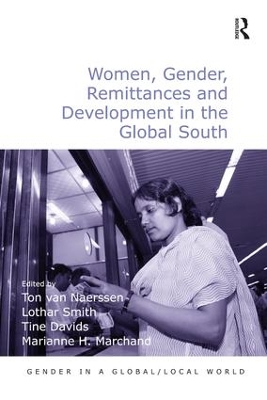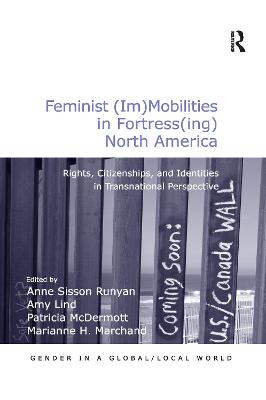Gender in a Global/Local World
2 total works
Women, Gender, Remittances and Development in the Global South
by Ton van Naerssen, Dr. Lothar Smith, and Professor Marianne H. Marchand
Published 28 June 2015
This book endeavours to take the conceptualisation of the relationship between transnational remittance exchanges and gender to a new level. Thus, inevitably, it provides a number of case studies of relationships between gender and remittances from around the world, highlighting different processes and practises. Thereby the authors seek to understand the impact of remittances on gender and gender relations, both at the sending as well as at the receiving end. For each case study authors ask how remittances affect gender identities and relationships but also vice versa. By itself this already adds a wealth of insights to a field that is remarkably understudied despite a volume of studies on gender and the feminization of migration in developing contexts. Chapters take an open, explorative approach to the relationship between gender and remittance behaviour with the aid of case studies focusing on transnational flows between migrants and countries of origin. With the wide variety of cases this book is able to provide conceptual insights to better understand how remittances affect gender identity, roles and relations (at both the receiving and sending end) and give specific attention to the roles of various actors directly and indirectly involved in remittance sending in current collectively organized remittance schemes from around the world.
Feminist (Im)Mobilities in Fortress(ing) North America
by Asst Prof Amy Lind and Professor Marianne H. Marchand
Published 1 January 2013
Since the establishment of the North American Free Trade Agreement (NAFTA) tensions concerning immigration trends and policies, which continued to escalate at the turn of the millennium resulted in revised national security policies in Mexico, Canada, and the United States. These tensions have catalyzed the three governments to rethink their political and economic agendas. While national feminist scholarship in and on these respective countries continue to predominate, since NAFTA, there has been increasing feminist inquiry in a North American regional frame. Less has been done to understand challenges of the hegemonies of nation, region, and empire in this context and to adequately understand the meaning of (im)mobility in people's lives as well as the (im)mobilities of social theories and movements like feminism. Drawing from current feminist scholarship on intimacy and political economy and using three main frameworks: Fortressing Writs/Exclusionary Rights, Mobile Bodies/Immobile Citizenships, and Bordered/Borderland Identities, a handpicked group of established and rising feminist scholars methodically examine how the production of feminist knowledge has occurred in this region. The economic, racial, gender and sexual normativities that have emerged and/or been reconstituted in neoliberal and securitized North America further reveal the depth of regional and global restructuring.

